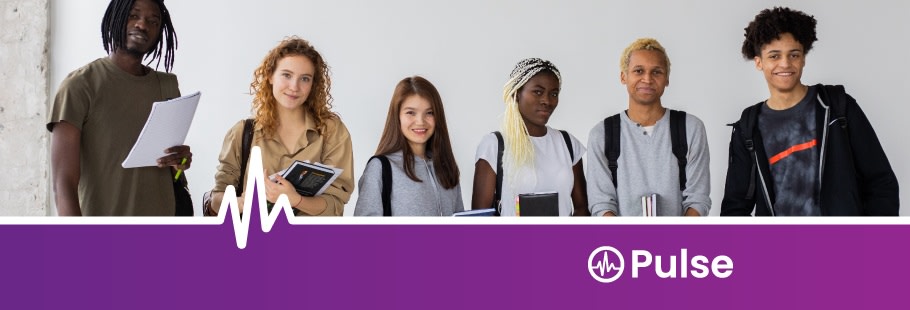
September Starts, Rising Confidence & Alumni Choices – Postgraduate Pulse Update for July 2021
The summer is a key point in the postgraduate application cycle in a normal year. The opening of Masters and PhD student finance provides a checkpoint and prompt for UK students – albeit one that may be as confusing as it is encouraging. For international students, meanwhile, June and July are crucial months in a longer and more complicated application process leading up to September.
The question, of course, is to what extent 2021 is a normal year. I'm personally sceptical that we'll see 'normality' in postgraduate recruitment in the immediate future, at least not in terms of a neatly repeating pattern. There are too many other factors in play for that though most – such as new visa routes and a focus on flexible PGT study – have the potential to be very positive. In any case, our Pulse tracker is intended to keep an eye on what's happening across the PGT and PGR recruitment landscape.
Here are a few takeaways I've picked out of the data as we head into summer.
Overall interest is rising and recovering
Pulse isn't simply a response to Covid-19. But the decision to set up a unique 'always on' insights tool was prompted, in part, by the need to understand how the pandemic was impacting confidence in postgraduate study – and to do so in as close to real time as possible.
So it makes sense to start with this overall benchmark. Thankfully, the trends here continue to be both plausible and positive (always a good combination when working with data).
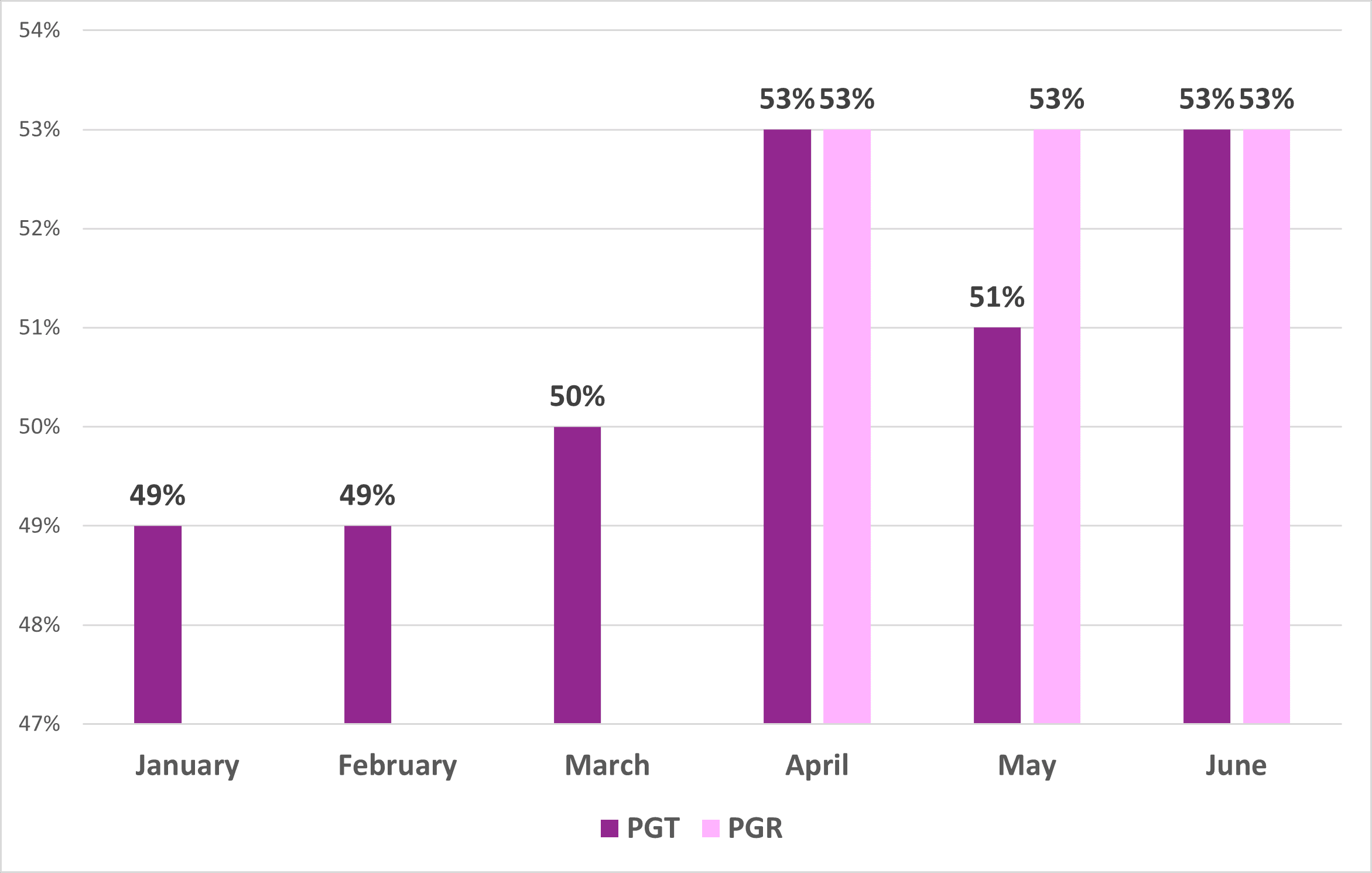
Overall attitudes to postgraduate study
We're looking here at the percentage of students who say they're 'very confident' about postgraduate study this year.
Whereas last month we noticed a dip in PGT confidence (probably prompted by rising case numbers plus international travel restrictions introduced in April and May) June data sees sees a recovery to the same level as March.
We don't see the same kind of dip and recovery for PGR interest. Pulse was only integrated into FindAPhD from April, meaning we don't have data to compare from the winter 'second wave' (when PGT confidence was lowest). We'll see how the trends for PGT and PGR compare going forward, but it may simply be that prospective PhD students are understandably – and necessarily – more committed.
Regional trends continue to vary quite significantly
One thing we've consistently seen with Pulse so far is that attitudes to Masters and PhD study vary dramatically around the world, reflecting the highly international nature of the postgraduate education sector, together with the uneven impact of the pandemic.
It's a little easier to see the trends here if we chart them separately:
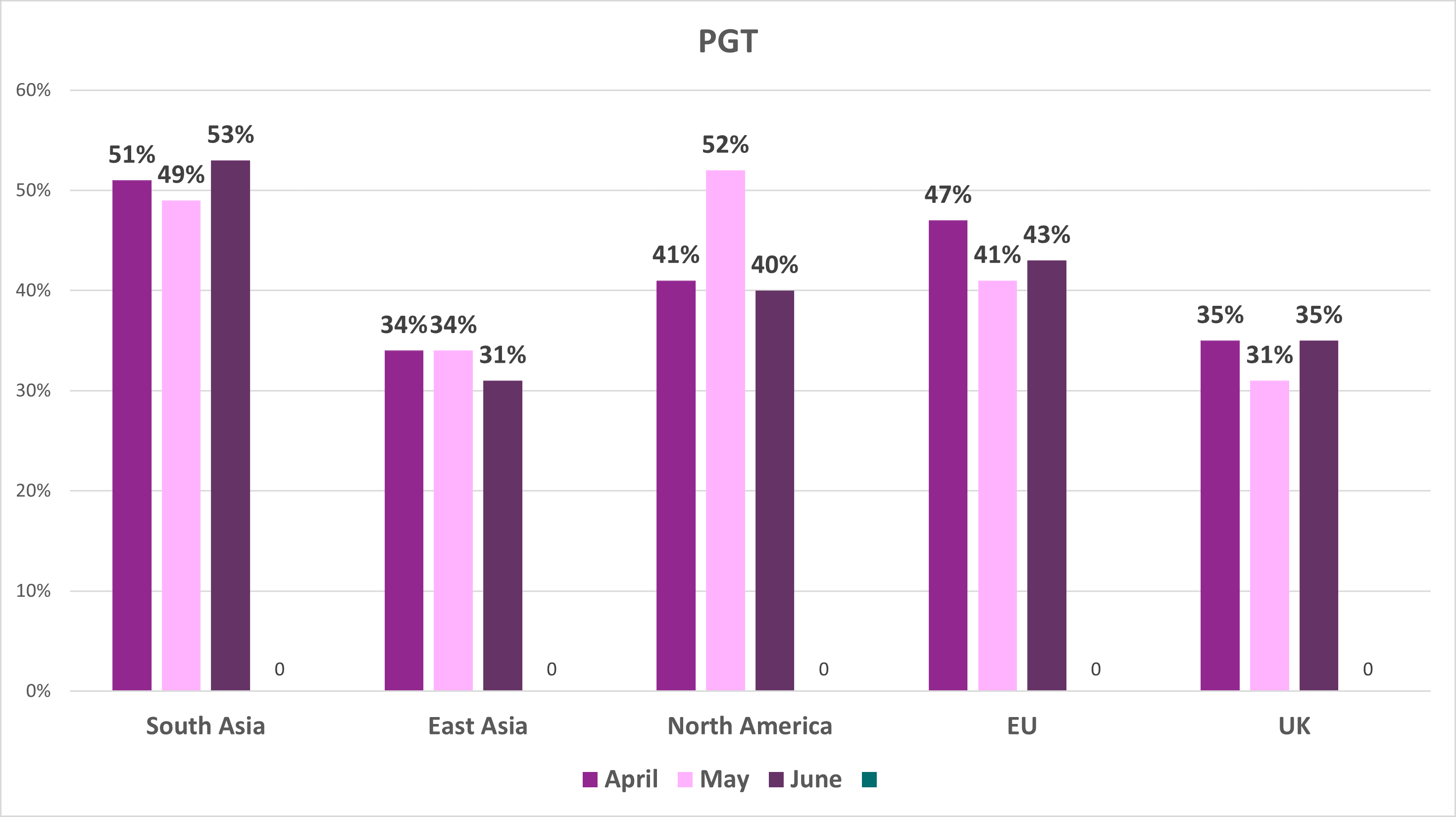
Regional attitudes to postgraduate taught study
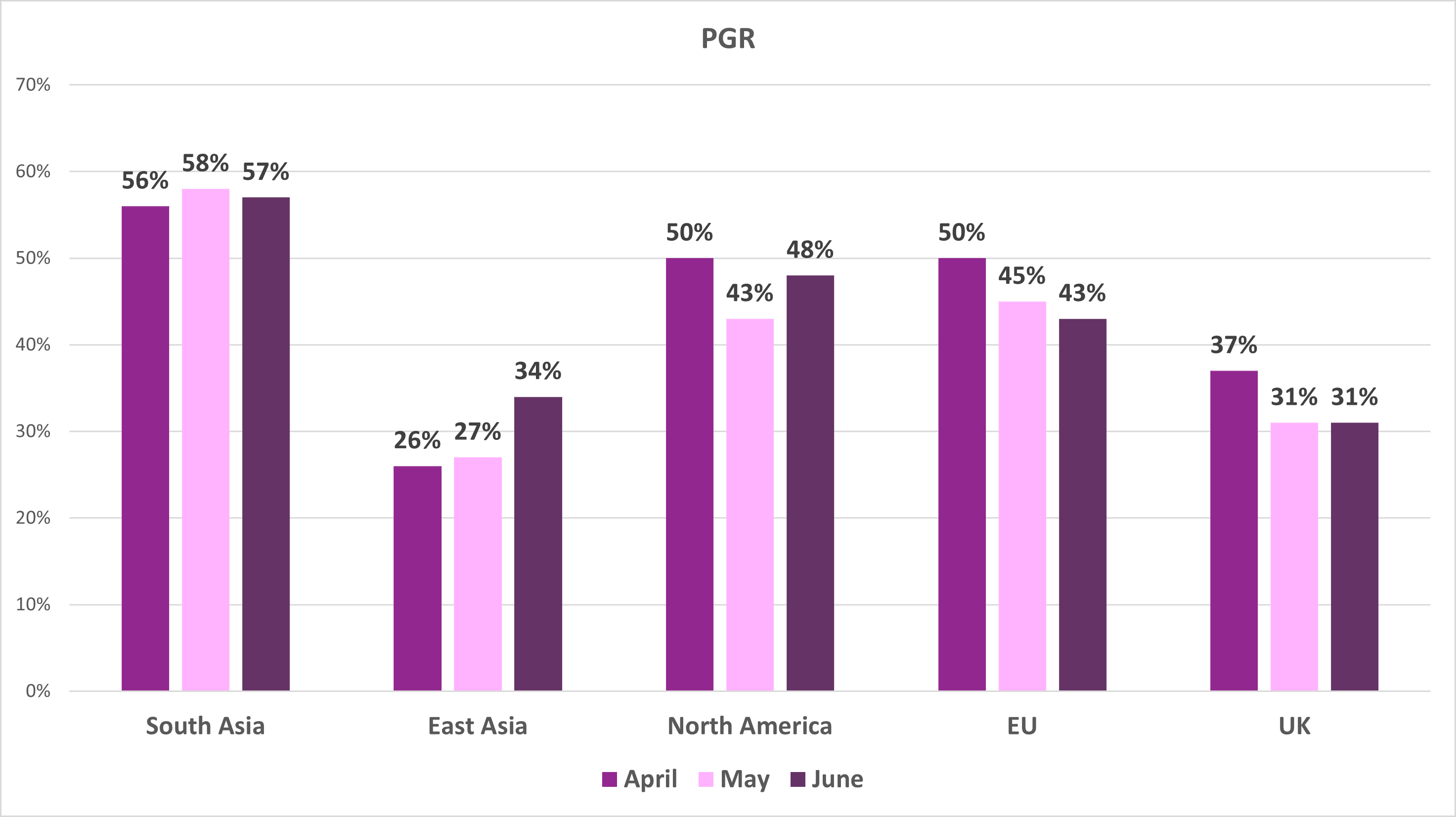
Regional attitudes to postgraduate research study
Certain aspects of the overall trend are reflected here: PGR confidence is generally higher whilst most PGT audiences see a dip in interest during May, followed by a recovery in June. But there are some important details.
- South Asia is by far the most resilient market with more than 50% of prospective students saying they're very confident about PGT or PGR study throughout April, May and June. This is despite the fact that countries such as India have been heavily impacted by travel restrictions during this period.
- East Asia, on the other hand, experiences the lowest confidence levels. The data here needs to be caveated with the fact that Chinese students are relatively difficult to engage with for this kind of market research. Nonetheless, there's something quite distinct happening here with PGR and PGT interest waxing and waning respectively. One possible conclusion is that the appeal of international (probably western) universities is resilient in terms of research, but that taught Masters programmes are less appealing in the face of actual or potential study restrictions.
- North America also sees a divergence between PGT and PGR with a spike and a dip in May. There isn't any obvious explanation for this and it may be one to watch in future months.
- EU students show the most negative trend with confidence in both levels of study decreasing from a high in April. Brexit is an obvious explanation and, indeed, the UK is the most popular destination for this audience. If so, there may be a task for UK universities in communicating the recent UKRI changes to EU applicants (who are now eligible for a capped number of 'full' studentships).
- UK confidence is lowest, but remember that we're only comparing trends for the highest level of interest here. With UKRI funding still in mind, we're also in something of a hinterland between the 21-22 and 22-23 application cycles. It'll be interesting to see if the opening up of student finance applications at the end of June is visible in the July and August data. Watch this space.
From a marketing and recruitment point of view, the challenge here will be in supporting and sustaining interest from regions such as South Asia (where interest is very high but feasibility is more complex) whilst ensuring that UK and EU students fully understand their funding and finance options.
Interest in 2022 is increasing (especially for January)
Whilst there's still plenty of interest in September 21 (and plenty of opportunity to recruit for these courses) we're also seeing a natural shift over to 2022 for prospective Masters students. This is hardly surprising, but it's interesting to be able to visualise it through Pulse:
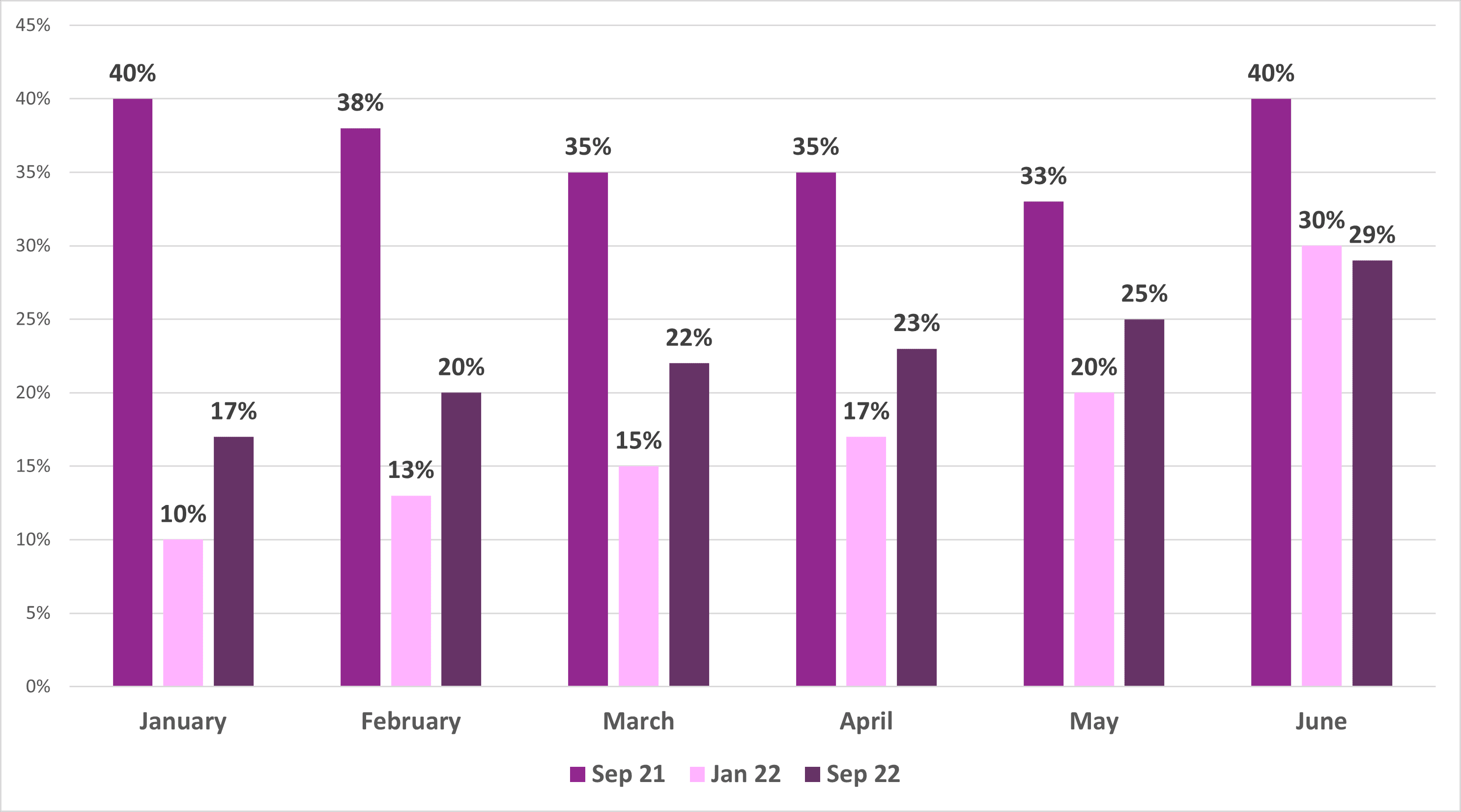
When do prospective students intend to commence postgraduate study?
There's been an ongoing drift away from September 21 for some months* but June is the first time we see interest in January 22 overtake September 22; roughly a third of the current PGT pipeline are now focussing on a Masters in the coming spring semester.
I think there may be more to reveal here and I'll be aiming to drill down into the data for different subject areas and audiences. For now, it looks like we might be beginning to reveal a pivot point in the overall PGT recruitment cycle.
Needless to say, the effective promotion of January start opportunities will be key for those universities who plan to expand this part of their portfolio. The student interest is definitely there.
*Prior to June we allowed respondents to pick an 'asap' option, which isn't included in the results here. Its absence is probably responsible for the small increase in people picking September 21 last month.Almost 60% of prospective UK PhD students are considering their current university
...but it's the opposite for PGT.
We recently began asking Pulse participants if they were considering Masters or PhD study at their current or previous university. The proportion who would do so is low overall (probably reflecting a focus on international study) but it's relatively high for current UK students.
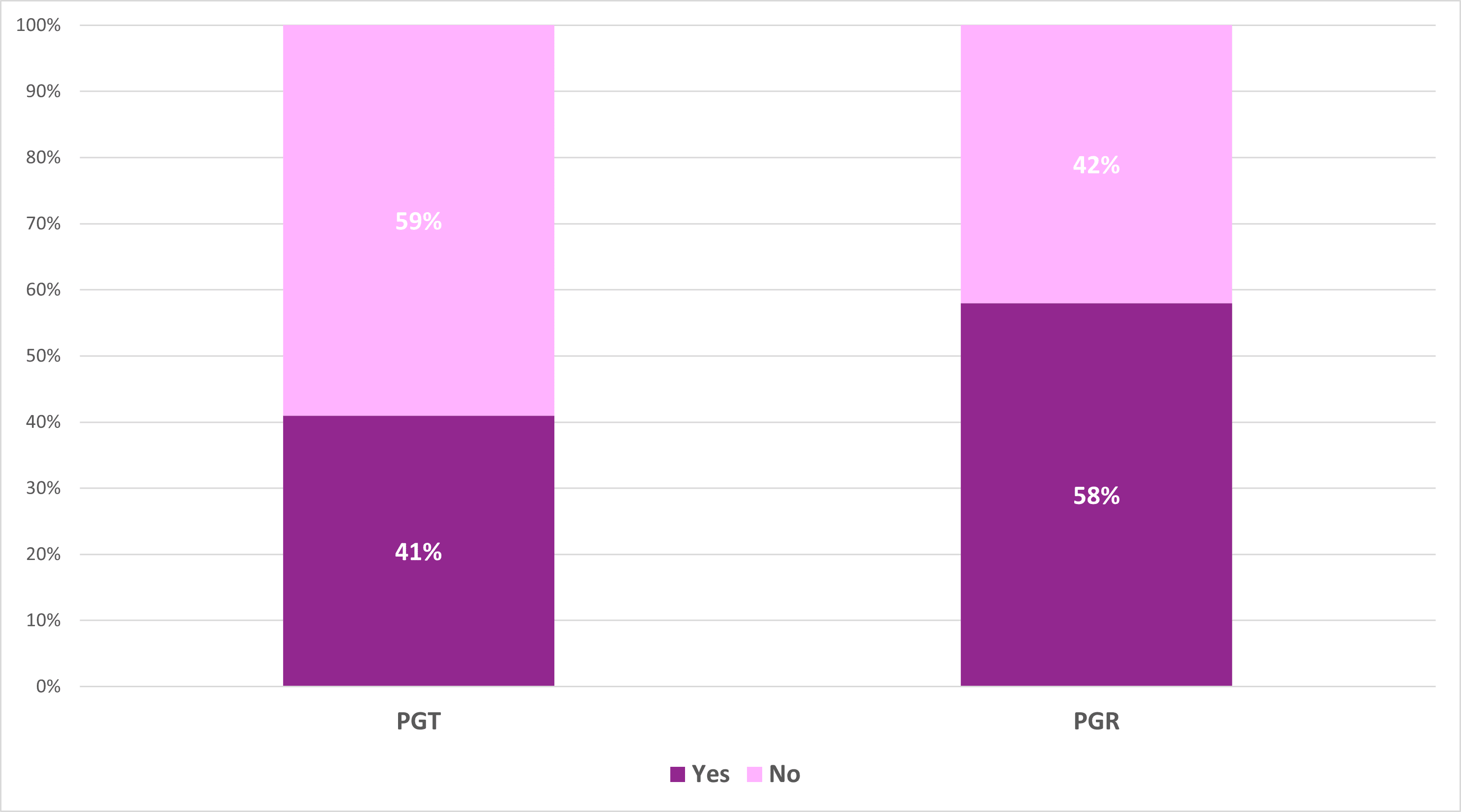
Are current UK students considering postgraduate study at their current / previous university?
Again, this is a plausible result. We'd assume prospective Masters students are motivated by the availability of more specialised programmes whilst prospective PhD students may be attracted by the opportunity to research within their current department (and may be naturally more aware of opportunities to do so).
The message here, I think, is not to take current undergraduate students for granted when it comes to PGT recruitment and to consider whether your Masters portfolio reflects the interests they may be developing. This is something we can potentially help with, but it's also easy enough to engage with current students. Communicating alumni discounts and other incentives is also important. Speaking anecodtally, I'm always surprised how few students appear to be aware of these.
When it comes to PhD, the challenge may be cutting through to those students who aren't searching (as) actively for opportunities beyond their current university. This could involve getting creative with highlighting faculty achievements and ongoing projects. Remember, all's fair in love and postgraduate recruitment. Provided you're nice.
What's coming next?
We're now four months into the process of collecting and analysing data through Pulse (you can read insights and results from April, May and June elsewhere on the site) with responses from nearly 40,000 prospective postgraduate students in total.
Tracking the impact of the pandemic continues to be a priority, but it's already fascinating to be able to see how the postgraduate recruitment pipeline shifts over time; I'm hoping to do more of this in the August update.
We'll also be getting ready to share results from our in-depth Future Student surveys, which explore attitudes to postgraduate study in greater detail (including information on exactly what students do and don't look for in courses and universities as well as the obstacles they perceive in accessing further study). As always, you can sign up below. You can also get in touch with me directly if there's something in particular you'd like us to investigate or explore.
You may also like...
Coronavirus and international study
Last month we dug into the Pulse data to investigate how the pandemic was affecting attitudes to different postgraduate study destinations.
Tips for working with student content creators
Paul Hodgson of the University of Nottingham explains how to set up, manage and support an effective network of student contributors.


